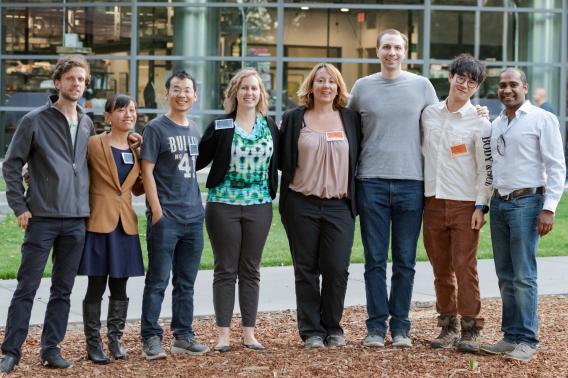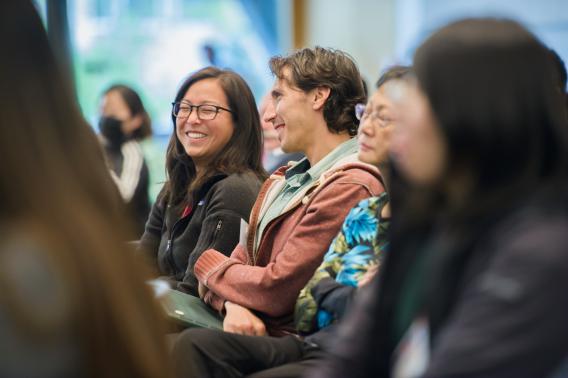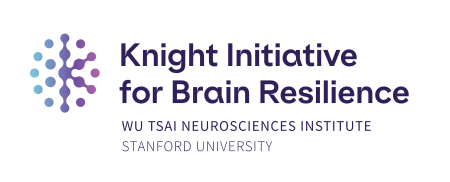Brain Resilience Postdoctoral Scholars supported by the Knight Initiative are generating paradigm-shifting insights on the mechanisms of neurodegeneration and how to maintain brain resilience into old age.
The Knight Initiative for Brain Resilience awards interdisciplinary postdoctoral scholars with creative proposals that have the potential to generate insights on neurodegeneration and clues to emulate healthy brain aging as we get older.
"The Brain Resilience Postdoctoral Scholar Award has created an enriching community of scholars that have positively impacted my research and encouraged my interest in studying the aging brain.”
– Ravi Nath, a member of the inaugural Brain Resilience Postdoctoral Scholar cohort
Application
This program is open to current Stanford postdocs. Our next postdoc applications will open in Winter Quarter 2024.
Contact Zulema Garibo with questions.
Our Model
Program Tracks
Brain Resilience Postdoctoral Scholar Award
The Brain Resilience Postdoctoral Scholars award of the Knight Initiative for Brain Resilience supports trainees generating paradigm-shifting insights on the mechanisms of neurodegeneration and how to maintain brain resilience into old age.
Interdisciplinary Postdoctoral Scholar Award
Wu Tsai Neuro's Interdisciplinary Scholars supports innovative young researchers with backgrounds in basic and clinical neurosciences, biomedical sciences, physical sciences, social sciences, engineering, education, law, business and humanities who are engaged in cutting edge interdisciplinary research across the neurosciences.
Funding
This program awards two years of fellowship funding and is pleased to provide parental leave. Postdoctoral scholars also receive $5,000 of discretionary research funds annually.
Mentorship
All scholars meet monthly with their cohort and program faculty mentors Miriam Goodman and Liqun Luo to share ideas and discuss approaches to scientific and career challenges, visit each other’s labs to learn about different research techniques and areas of study, and practice communicating their research to scientific and general audiences.
In addition, Brain Resilience Scholars attend Knight Initiative events and seminars and are stewarded by Knight Initiative Associate Director Natasha Hussain and faculty mentor Elizabeth Mormino to learn from one another and build community around the topic of neurodegeneration and brain resilience.
Diversity
Our programs bring together cohorts of postdocs representing the broad range of demographic, experiential and scientific diversity. Women and postdocs from groups underrepresented in the neurosciences are strongly encouraged to apply.
Learn more

Application and Eligibility Details
Carefully review the detailed information below if you are interested in applying to the Brain Resilience Postdoctoral Scholars track or Interdisciplinary Postdoctoral Scholars track of the program.


Meet our scholars
Get to know the young researchers advancing our understanding of neurodegeneration, brain aging, and neurological resilience.
Funded Brain Resilience Scholar projects
High-resolution profiling of Alzheimer’s brain resilience
Resilience to Alzheimer’s disease (RAD) describes those rare individuals who exhibit normal cognitive function
while harboring a high disease burden. Better understanding of the mechanisms that confer protection against
cognitive decline despite high-level AD pathology offers potential therapeutic insights for preventing dementia in AD. Recent advances in the field provide a unique opportunity to explore the spatial distribution of molecules in the human brain at an unprecedented level of detail.
Rejuvenating sleep to enhance brain resilience with age
Sleep is a critical behavioral state that fulfills essential needs for health, including clearing waste products (e.g., protein aggregates) from the brain. But sleep is not everlasting. As humans age, sleep quality strikingly deteriorates, and this decline is associated with dementias (e.g., Alzheimer’s disease).
Determining the role of circadian transcriptional control in myelin-forming precursors in neurodegeneration
The causes of neurodegenerative disorders like multiple sclerosis or Alzheimer’s disease are incompletely understood, hindering our ability to gain precise diagnoses and design effective therapeutics. Understanding how the circadian rhythms regulate myelin-forming precursors will impart unique insights into normal and aberrant myelination and will have a positive impact on developing therapeutic strategies to restructure myelin.
The origin of neurodegeneration: insight from a unique colonial chordate
With an aging population, neurodegenerative disorders contribute increasingly to our global health burden with no cure or effective treatments. Amyotrophic lateral sclerosis (ALS) and frontotemporal dementia (FTD) are two neurodegenerative disorders that are distinct in clinical presentation (ALS impairs movement/breathing, whereas FTD impairs behavior/cognition).



